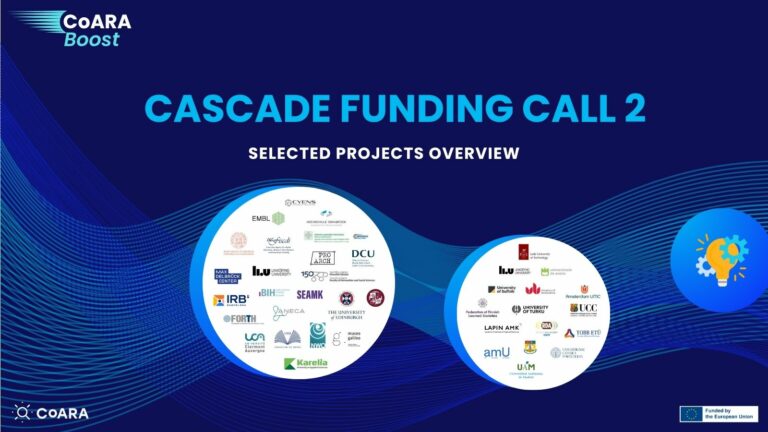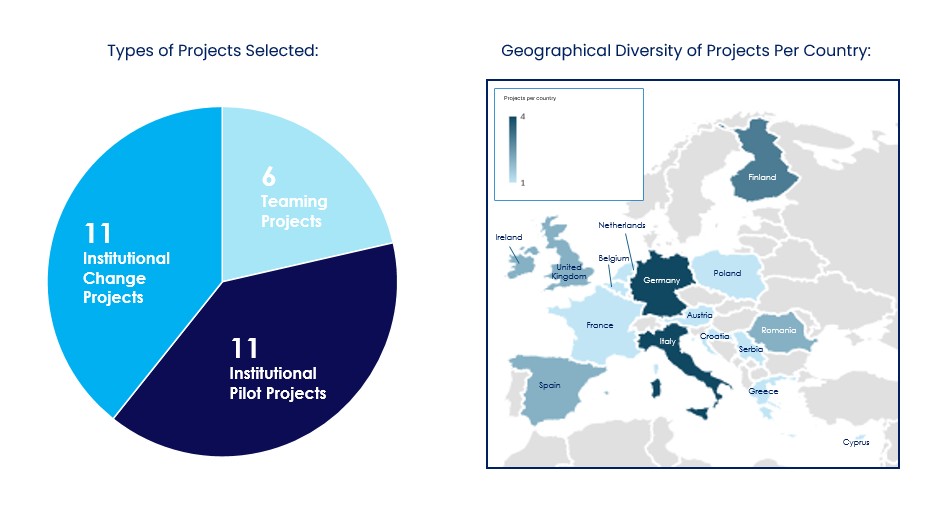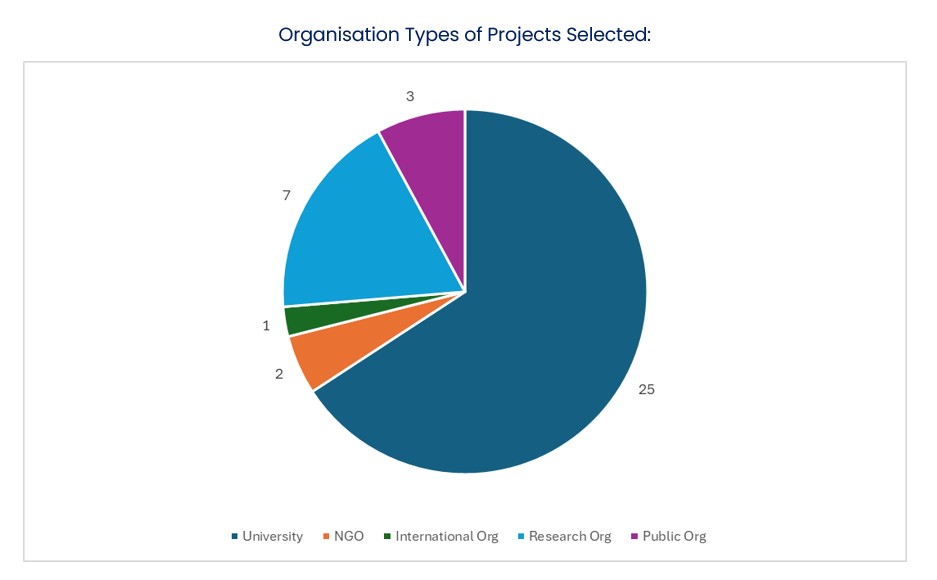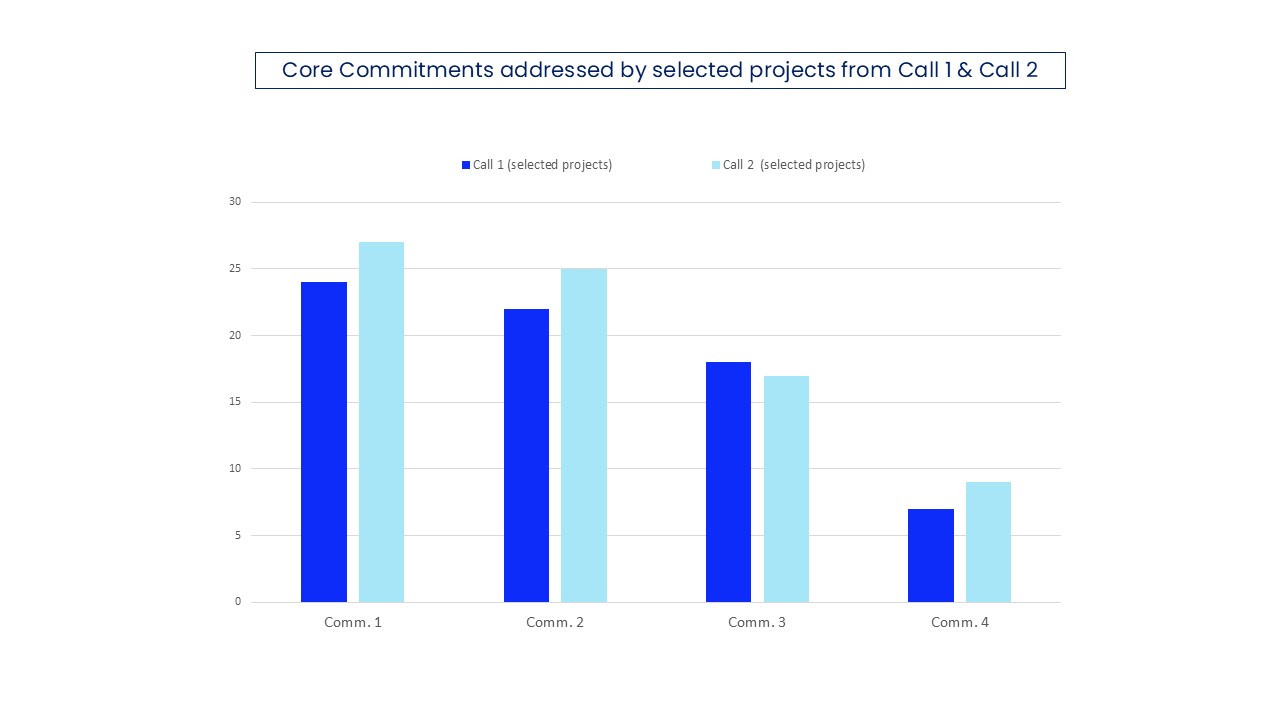CF2 Selected Projects
Overview
28 Projects Selected in Second Round of Cascade Funding
The Second Call for Cascade Funding, which opened in February 2025, generated strong engagement from institutions across the European Research Area and beyond, with over 130 applications received. In July 2025, 28 projects were selected as part of the Second Call for Cascade Funding.
To learn more about the 28 selected projects for the Second Call for Cascade Funding, please click the button below:

Types of Projects
The selected projects represent a diverse and balanced portfolio of initiatives that aim to catalyse institutional reform at various stages of development, including three types of projects:
- 11 selected Institutional Pilot Projects: supporting innovative and experimental projects that explore new assessments approaches, procedures, frameworks, and tools in the context of a clearly defined initiative. Each project may receive up to €30,000, with a one-year duration.
- 6 selected Teaming Projects: facilitating mutual exchange and knowledge transfer of best practices among up to 3 different organisations. These projects are funded up to €40,000 for one year.
- 11 selected Institutional Change Projects: accelerating change in procedures and process in an organisation to establish long-lasting, institutional reform. These projects can receive up to €60,000 for a one-year term.
The below graphs outline the breakdown of selected projects in the Second Call for Cascade Funding, showing the diversity of types of projects selected, the geographical diversity of selected projects’ organisations, and the distribution of organisation-type of selected projects.



Cascade Funding Beneficiaries: Second Call
Based on the decision of CoARA’s evaluation panels, the below 28 selected projects are currently underway:
Institutional Pilot Projects
| Organisation |
Project Title |
|
Sigmund Freud Private University |
CoARAverse in Psychology: Piloting reforms to foster and assess diverse research cultures with a focus on participation, qualitative indicators, and peer-review |
|
Karelia University of Applied Sciences |
Assessment Tool for evaluating the qualitative impact of RDI activities at Universities of Applied Sciences |
|
Alma Mater Studiorum – Università di Bologna |
Leveraging the local research evaluation system to raise awareness at the University of Bologna |
| University of Edinburgh | Adoption by Example: Reflecting Open Research Progress to Guide Transformations in Assessment |
| European Molecular Biology Laboratory (EMBL) | From skills to recognition: A pan-EMBL Data Stewardship Programme for the Research Assessment Reform |
| ProArch | APRO – Architectural Projects as Research prOducts: towards shared assessment criteria |
|
CYENS Centre of Excellence |
Transforming Research Assessment at CYENS: Towards a Responsible, Inclusive and Impact-Driven Model (TRAC) |
|
Azienda USL IRCCS di Reggio Emilia |
FairEval: Developing Fair and Responsible Research Assessment Models at IRCCS of Reggio Emilia |
|
Institute of Economic Sciences |
Advancing Research Assessment in Serbia: A Pilot Project for the Institute of Economic Sciences – ARISE |
|
Max Delbrück Center (MDC) |
RECAST – Reforming Evaluation Criteria for Assessment, Science, and Teams |
|
FHSS of the University of Zagreb |
Responsible Indicator Framework for Humanities and Social Sciences |
Teaming Projects
| Organisations | Project Title |
| Lodz University of Technology, Linköping University, University of Aveiro |
DIVERSE+: Advancing Diverse and Qualitative Research Assessment Across Europe |
|
University of Suffolk, University of Bedfordshire |
Reforming Research Assessment: Building Inclusive, Open, and Equitable Evaluation Practices through Open Educational Resources |
| Federation of Finnish Learned Societies, Lapland University of Applied Sciences, University of Turku | Implementing Framework for Assessment: Case FIN-CAM |
| University of Bucharest, Universidad Autonoma de Madrid, Aix-Marseille University | Laboratory of Engagement with Research Assessment Reform (LERAR): exchanging good practices between three members of one European university alliance, CIVIS |
| Research Data Alliance Association, Catholic University of Portugal, TOBB University of Economics and Technology |
Teaming for self-evaluation in research assessment across scales: from researchers to institutions |
| University College Cork, AmsterdamUMC | ORFIRA – Introducing an Open Research Framework and integrating Open Research indicators into Research Assessment |
Institutional Change Projects
| Organisation |
Project Title |
| Museo Galileo – Istituto e Museo di Storia della Scienza | MUSEVAL – A Framework for Museum-Based Research Evaluation |
| Université Clermont Auvergne | Integrating Open Science into the Qualitative Research Assessment Reform at University Clermont – Auvergne-OSQuAR-UCA |
| Osnabrück University of Applied Sciences | REACH – REady for lAsting CHange in research assessment at Osnabrück University of Applied Sciences |
| Seinäjoki University of Applied Sciences (SEAMK) | CAREER‑PILOT: CoARA‑Aligned Pathway Pilot at SEAMK |
| Foundation for Research and Technology Hellas |
Mind the Gender Gap in Computer Science (MindGenGapICT) |
| Dutch Research Organisation (NWO) | Non-traditional key output in evidence based CVs for applicants |
| Berlin Institute of Health at Charite | MERIT-BIH Groups: Institutionalizing Fair and Robust Research Assessment of Research Groups through Infrastructure |
|
Fundació Institut de Recerca Biomèdica (IRB Barcelona) |
THRIVE – Towards holistic and responsible institutional evaluation at IRB Barcelona |
| National Agency for Quality Assessment and Accreditation (ANECA) | Pilot Experiments for Innovative Academic Assessment under ANECA’s CoARA Action Plan (PEI3AC) |
| UEFISCDI | ARIA – Advancing Responsible and Inclusive Assessment at UEFISCDI |
| Dublin City University | Reforming research assessment throughout the employee lifecycle |
The projects are scheduled to launch in September 2025. Stay tuned for periodic updates on development of each project by following our dedicated Zenodo community and through the CoARA Newsletter!
Reviewers
In the Second Call for Cascade Funding, a curated pool of external reviewers were selected to ensure diversity in geography, expertise, gender, and career stage. Beneficiaries of the First Call were also involved in the review process to further reinforce peer learning within the CoARA community.
The 28 projects were selected after careful evaluation by expert reviewer panels. The selections would not be possible without the dedicated effort of reviewers who offered their time and expertise to provide thorough assessment of each application. We want to extend a huge thank you to them!
Reviewers contributing to the first call:
| Dr. | Tim | ENGELS | University of Antwerp |
| Dr. | Julie | NORTHAM | Health Sciences University |
| Pr. | Bruno | BEU | FCT – Foundation for Science and Technology |
| Mr. | Marios | DEMETRIADES | University of Cyprus |
| Ms. | Olivia | DENK | Swiss Academies of Arts and Sciences |
| Pr. | Mohamed | GARGOURI | University of Carthage |
| Dr. | Sybille | HINZE | Berlin University Alliance (BUA) |
| Pr. | Mikael | LAAKSO | Tampere University |
| Pr. | Keti | TSOTNIASHVILI | Ilia State University |
| Dr. | Oscar Xavier | GUERRERO GUTIERREZ | Cinvestav |
| Dr. | Tracey | WEISSGERBER | University of Coimbra |
| Dr. | Natàlia | DAVE | Centre de Regulació Genòmica |
| Pr. | João | RAMALHO-SANTOS | University of Coimbra |
| Dr. | Matthias | KIESSELBACH | German Research Foundation (DFG) |
| Pr. | Federica | CAPPELLUTI | Politecnico di Torino |
| Dr. | Nataša | JERMEN | The Miroslav Krleža Institute of Lexicography |
| Pr. | Dominik | ANTONOWICZ | Nicolaus Copernicus University |
| Pr. | João | CLARO | INESC TEC and Faculty of Engineering, University of Porto) |
| Mrs | Elpida | CHRISTOU | European Office of Cyprus |
| Dr. | Anna | SEAGER | Swansea University |
| Pr. | Toma | SUSI | University of Vienna |
| Dr. | Xavier | ARINO | Universitat Autonoma de Barcelona |
| Dr. | Tony | ROSS-HELLAUER | Know Center Research GmbH |
| Mrs | Veera | JORO | Häme University of Applied Sciences |
| Mr. | Björn | HAMMARFELT | University of Borås |
| Dr. | Katarzyna | SWIERK | University of Gdansk |
| Pr. | Nataša | JAKOMINIC MAROT | University of Rijeka |
| Dr. | Csanád | BODO | Eötvös Loránd University |
| Pr. | Montserrat | CASTELLO | Universitat Ramon Llull |
| Dr. | Dagmar | ELEVELD – TRANCIKOVA | Radboud University Medical Centre, Nijmegen |
| Dr. | Inês | T. ALMEIDA | University of Coimbra |
| Dr. | Kamila | LEWANDOWSKA | University of Warsaw |
| Dr. | Cristina | ARIMANY | IBEC |
| Dr. | Oleksandr | BEREZKO | Institute for Open Science and Innovation |
| Dr. | Leoš | HORNICEK | Czech Academy of Sciences |
| Dr. | Krishma | LABIB | Vrije Universiteit Amsterdam |
| Pr. | Saša | ZELENIKA | University of Rijeka |
| Dr. | Eva | MENDEZ | UC3M |
| Dr. | Pastora | MARTINEZ SAMPER | Universitat Oberta de Catalunya |
| Mr. | Andreas | RAGGAUTZ | University of Graz |
| Pr. | Steve | JOHNSON | Leeds Trinity University |
| Dr. | Hannelore | VANHAVERBEKE | KU Leuven |
| Pr. | Arzu | GONENC SORGUC | Middle East Technical University |
Thank you to everyone who participated in the Cascade Funding programme, helping to advance institutional reform of research assessment practices!